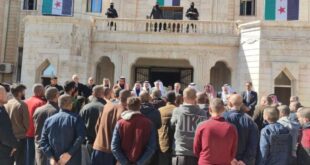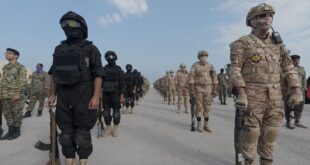There is an air of relief blowing in with the hot sea breeze over the Gaza Strip these days, but it’s one salted with worry that factional warfare which ended in victory for Hamas two weeks ago could swiftly return.It is a concern shared by Abu Mahmoud, as the deputy commander of the Islamist movement’s security arm prefers to be known. “We are fully in control at the moment,” he told Reuters in the imposing Gaza City compound seized from the Palestinian president’s secular Fateh forces on June 14.
“But people are still in shock. There may be sleeper cells. We will try to abort every crime in its cradle.” But his Executive Force, now seemingly ubiquitous with their beards, blue camouflage and Kalashnikovs, number only 6,000, Abu Mahmoud said this week — compared to 40,000 men, many of them from Fateh, who hitherto held fractious sway in the enclave.
Efforts are under way to resurrect the former police force.
Nonetheless, many Gazans credit the Hamas force and its young auxiliaries recruited from mosques with bringing an order long lacking to their streets. Food shortages that were widely feared when Israel closed the border have yet to materialise.
Women say they feel more pressure to cover their heads. Even an ageing beggar, long a fixture at one intersection, suddenly wears a full veil. But although beards for men are also increasingly de rigeur, the Hamas leadership insists it will not impose its Islamic values or set up an Islamic state in Gaza.
Yet the belief that Hamas men posted at major junctions will shoot at anyone jumping the lights has also ended traffic jams, many say — Abu Mahmoud insists any shootings at motorists are “individual acts”, not on any central orders from his office.
He also echoes the conciliatory tone of Hamas’ Ismail Haniyeh, whom he still calls prime minister despite his dismissal after the “coup” by US-backed President Mahmoud Abbas. “We are not a police force for one faction,” he says.
An order had been given, he added, to take down the green Islamist banners that have sprouted on public buildings since the takeover. Palestinian national flags would replace them.
“We are serving all our people,” he insisted, making clear in passing his disapproval of the heavy, expensive furniture he has inherited from the previous occupant of his office — the Fateh head of military intelligence. “Not my office,” he smiles.
“Our battle wasn’t with Fateh. It was with a tiny part of Fateh that was financed and armed by the [Israeli] occupier and the Americans,” he added, insisting most members of the party that dominated under the late Yasser Arafat had nothing to fear.
Â
‘Poor policeman’
Â
So far, many of the 1.5 million people of Gaza seem ready to believe that this has been true. Fateh flags still fly from party offices. A settling of scores in the immediate aftermath of the week of June fighting appears to have abated.
Members of the Fateh-dominated police force will be welcomed back, Abu Mahmoud said. Meetings are imminent to try to arrange this as officers fret over conflicting orders from Fateh leaders in the West Bank who say they will fire anyone who obeys Hamas.
“The poor policeman is living in confusion,” the executive force commander acknowledged. “He’s hesitating to come to work.” Leading Fateh figures who actively opposed Hamas have fled or are lying low. Abu Mahmoud insists he holds no political prisoners — though he does bring Fateh officials in to the Saraya, the old British-built fortress-cum-jail in Gaza City, to check they are not holding what rightly belongs to the public.
They get a receipt, he says, for anything handed in.
So far, Gazans are enjoying a tranquility they have scarcely known since an election 18 months ago, which Hamas won to put the two factions on a collision course. The beaches were crowded this weekend as people escaped the heat and relished the freedom from the fear of being caught in crossfire to get there.
As he deals with a succession of calls on a mobile phone that plays an Islamic religious ringtone, Abu Mahmoud is clearly proud of a stability that, he notes, has allowed foreigners to return to Gaza with more assurance than at any time in the last few months, when kidnapping had been a particular menace.
He hopes the Executive Force can merge itself into a civil police force and that the Fateh officials who once handled the crossings with Israel and Egypt can return to work to reopen the borders — Israel refused to deal with Hamas directly.
“We are ready to make concessions,” Abu Mahmoud assures.
But the Islamists have few friends, beyond some support from Iran and Syria, and the prospects for dialogue and continued calm appear slim to many. Hamas maintains its hostility to the interim peace deals concluded between Arafat and Israel and both Abbas and the Jewish state are set on ending its rule in Gaza.
Yet for Abu Mahmoud, giving up on principles is not an option. Jailed by both Israel and Fateh, the former bodyguard to Hamas leader Abdel Aziz Al Rantissi, killed by Israeli forces in 2004, says: “Negotiation is not against our religion. But conceding the interests of the people is against our religion.
“Under no circumstances will we concede those rights.”Â
 Eurasia Press & News
Eurasia Press & News



